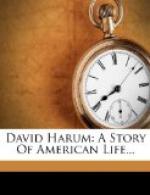Yes, he had called upon Mr. Lenox and his call had been returned. In fact, they had had several visits together—had met out walking once and had gone on in company. Was Mr. Lenox “nice”? Yes, he had made a pleasant impression upon Mr. Euston, and seemed to be a person of intelligence and good breeding—very gentlemanlike. Why did not people know him? Well, Mr. Euston had made some proffers to that end, but Mr. Lenox had merely expressed his thanks. No, Mr. Euston did not know how he happened to be in Homeville and employed by that queer old Mr. Harum, and living with him and his funny old sister; Mr. Lenox had not confided in him at all, and though very civil and pleasant, did not appear to wish to be communicative.
So our friend did not make his entrance that season into the drawing or dining rooms of any of what David called the “nabobs’” houses. By the middle or latter part of October Homeville was deserted of its visitors and as many of that class of its regular population as had the means to go with and a place to go to.
It was under somewhat different auspices that John entered upon the second winter of his sojourn. It has been made plain that his relations with his employer and the kind and lovable Polly were on a satisfactory and permanent footing.
“I’m dum’d,” said David to Dick Larrabee, “if it hain’t got putty near to the p’int when if I want to git anythin’ out o’ the common run out o’ Polly, I’ll have to ask John to fix it fer me. She’s like a cow with a calf,” he declared.
“David sets all the store in the world by him,” stated Mrs. Bixbee to a friend, “though he don’t jest let on to—not in so many words. He’s got a kind of a notion that his little boy, if he’d lived, would ‘a’ ben like him some ways. I never seen the child,” she added, with an expression which made her visitor smile, “but as near ’s I c’n make out f’m Dave’s tell, he must ‘a’ ben red-headed. Didn’t you know ’t he’d ever ben married? Wa’al, he was fer a few years, though it’s the one thing—wa’al, I don’t mean exac’ly that—it’s one o’ the things he don’t have much to say about. But once in a while he’ll talk about the boy, what he’d be now if he’d lived, an’ so on; an’ he’s the greatest hand fer childern—everlastin’ly pickin’ on ’em up when he’s ridin’ and such as that—an’ I seen him once when we was travelin’ on the cars go an’ take a squawlin’ baby away f’m it’s mother, who looked ready to drop, an’ lay it across that big chest of his, an’ the little thing never gave a whimper after he got it into his arms—jest went right off to sleep. No,” said Mrs. Bixbee, “I never had no childern, an’ I don’t know but what I was glad of it at the time; Jim Bixbee was about as much baby as I thought I could manage, but now—”
There was some reason for not concluding the sentence, and so we do not know what was in her mind.




